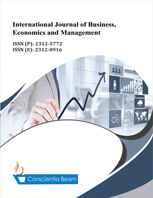Credibility and Monetary Policy under Inflation Targeting
DOI:
https://doi.org/10.18488/journal.62/2015.2.3/68.3.78.90Abstract
After more than two decades of inflation targeting in the world, it is important to evaluate if the adoption of this regime in a relevant developing country contributed to the creation of a better environment for the process of entrepreneurs' expectations formation. Brazil is part of an important group of developing countries and represents a potential laboratory experiment in which the effects of an adoption of inflation targeting after more than a decade can be evaluated. Not enough is known about the consequences of inflation targeting credibility on both monetary policy and monetary policy transmission channels in developing countries that adopted inflation targeting. Emphasizing the role of transparency and the credibility of monetary policy as a performance criterion that motivate any country wishing to adopt an inflation targeting regime, this study leads to the fact that these two basic principles toward which a inflation targeting regime cannot be achieved without respect for certain pre namely institutional and technical conditions.

